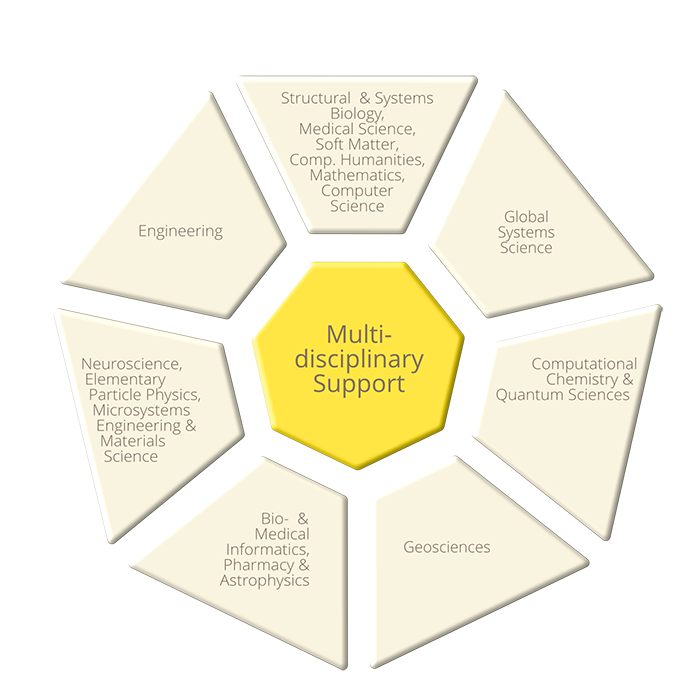bwHPC Competence Centers
The members of the bwHPC consortium have established teams for the operation and the support of the HPC clusters, data facilities as well as access, monitoring and information services. Some of those teams have specific tasks as established in the current support project of bwHPC, aka bwHPC-S5. Others, such as the bwHPC competence centers, constitute the infrastructure for user support beyond particular project or short term fundings.
 Support Areas & Structure
Support Areas & Structure
The bwHPC-S5 project offers user support via HPC Competence Centers consisting of expert teams from across the universities of Baden-Württemberg. In these centers, the available state-wide expertise for user support in selected research areas is bundled and concentrated. Consequently, the advisory foundation for the diverse scientific peer groups is strengthened and enlarged. The Competence Centers for different research areas are complemented by a cross-sectoral team for user support across all research areas.
Inquiries or support concerning particular HPC topics please address to the corresponding bwHPC competence center:
Support units of ticket system
| Topics covered by bwHPC Competence Center | Contact address | Coordinator(s) |
|---|---|---|
| Structural and Systems Biology, Medical Science, Soft Matter, Computational Humanities, Mathematics and Computer Science | email / bwForCluster Helix |
Dr. Sabine Richling (Univ. Heidelberg) |
| Global Systems Science |
Kilian Türk (Univ. Stuttgart) |
|
| Computational Chemistry and Quantum Sciences | email / bwForCluster JUSTUS |
Christian Mosch (Univ. Ulm) |
| Geosciences | email / bwForCluster BinAC |
Dr. Jens Krüger (Univ. Tübingen) |
| Bio- and Medical Informatics, Pharmacie and Astrophysics | astro email, bioinformatics email / bwForCluster BinAC |
Dr. Jens Krüger (Univ. Tübingen) |
| Neuroscience, Elementary Particle Physics, Micro Systems Engineering, and Materials Science | email / bwForCluster NEMO |
Bernd Wiebelt (Univ. Freiburg) |
| Engineering | email / bwUniCluster |
Dr. Jordan Denev (KIT) |
| Multidisciplinary HPC Support | email / bwUniCluster |
 Tasks
Tasks
- aid new users to access Baden-Württemberg's HPC systems;
- coordinate and conduct state-wide teaching courses and workshops covering know-how in dealing with Baden-Württemberg's HPC systems;
- produce and maintain an extensive documentation;
- provide a cluster independent, unified work environment and tools to simplify HPC cluster access and software usage;
- provide tools to manage (e.g. process or archive) scientific data;
- enable embedding of HPC innovations, and
- aid user's code porting and code parallelization activities supporting user's capability to utilize higher HPC tiers.

